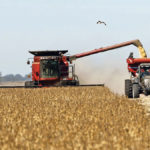In 1998, when he voted in favour of the merger of Alberta Wheat Pool and Manitoba Pool Elevators, Dick Haydu thought co-operatives had a future.
“I was enthusiastic that we’d have a true grain co-op for a long time,” said Haydu, a Paradise Valley, Alta., farmer and former Alberta pool delegate.
“We were going to be a co-operative. That was going to be our selling point to farmers.”
Now, four years later, the directors of the merged pools are planning to merge their new company, Agricore, with United Grain Growers, and ditch the co-op structure. If members of Agricore approve, the new company will no longer be a co-operative, even though it will be controlled by farmer directors.
Read Also

Geopolitics can change trade routes
WHISTLER, B.C. — Today’s geopolitical tensions could have dire long-term consequences, says the director of international policy at the University…
Agricore president Neil Silver said his company needs to merge with UGG and it would be financially impossible to convert UGG back into a co-op. That’s why Agricore will adopt UGG’s publicly traded structure.
Art Macklin, a Peace River area farmer, said he is sickened by Agricore’s move.
“It’s a bit of a betrayal of the co-op movement in Western Canada to come to this. All the sacrifice, all the success we had, to give it away.”
He said many members suspected the co-operative was beginning to back away from its roots, but members were always reassured the company was still committed to remaining a co-op.
“We’re going to stay a co-operative and not go the way Sask Pool did,” is what many delegates told local members, Macklin said.
Co-operatives were founded to provide service at cost so farmers could make profits on their farms, but as a publicly traded company, that won’t be true any more, he said.
“This radically changes that,” said Macklin. “They will have to pay dividends to shareholders.”
Haydu isn’t outraged by the proposed death of the co-op heritage that will occur if the merger goes ahead. Rather, he is saddened and resigned.
“It’s just an economic reality,” he said, giving the benefit of the doubt to Agricore’s farmer directors.
“They’re all good people, all good moral people, and the decision they make may not be what we like, but maybe they feel it’s a necessity.”
This tone is common in farmers who see their co-operative institutions fading and don’t know how to save them, said Roger Epp, a political studies professor at Augustana College in Camrose, Alta.
“One of the casualties of the last generation of restructuring has been the capacity (of many people) to think in terms of community interest or co-operative enterprise,” said Epp.
“Even the nature of farm work today doesn’t demand co-operation. If someone has a problem in the field, they don’t call their neighbour, they call the factory.”
Epp said many farmers, and especially young farmers, concentrate more on competing with each other to get ahead rather than co-operating for general gain.
That has led to a breakdown of the longtime consensus among farmers, making it hard for farmers’ grain co-operatives to take strong positions on farm issues.
Alberta Wheat Pool backed away from much of its farmer advocacy role after the Crow Benefit debate divided the membership, Epp said.
Alberta Pool and then Agricore began restricting themselves to issues relating to the handling of grain. That alienated some farmers who wanted more from a farmers’ co-operative.
Others were upset their co-op appeared to be closing elevators as fast as their private competitors and doing little that left farmers better off. The result was that many co-operative-minded farmers withdrew from the membership or became inactive.
“People for whom that was important might have dropped out,” said Epp. “You’ve had long-term people losing interest.”
Epp said he thought it ironic that the proposed ending of this co-op is taking place on the 100th anniversary of the founding of the Territorial Grain Growers’ Association in Indian Head, Sask., an event many feel to have been the birth of the prairie co-operative movement.
This retreat is happening when many farmers believe they are losing their economic influence, he said.
“In lots of ways we’ve returned to the economic conditions that created the co-ops.”
Haydu said he believes farmers are virtually powerless in the contemporary grain economy. Competition has become so intense that the farmers’ grain co-operatives have either decided to partially undo the co-op side, such as Saskatchewan Wheat Pool, or plan to completely abandon the structure, such as Agricore proposes.
“I’m skeptical that it will be a benefit to farmers,” said Haydu. “It’s sad to see this happen.”















